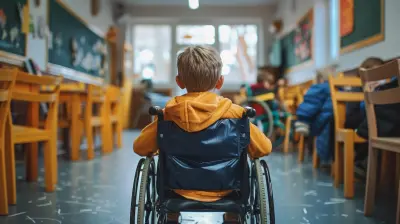Bullying in High School: How to Create a Safe Learning Environment
10 May 2025
Bullying in high school is a harsh reality for many students. It’s not just a passing phase—it leaves long-term emotional, psychological, and sometimes even physical scars. Every student deserves to feel safe, valued, and respected at school.
So, how do we put an end to bullying and create a secure learning environment? It's not just the responsibility of teachers and school staff—it requires a collective effort from parents, students, and the community. Let’s dive into the issue and explore real ways to combat bullying in high schools. 
Understanding Bullying in High School

What is Bullying?
Bullying isn’t just teasing or a little roughhousing. It’s aggressive behavior that involves a real or perceived power imbalance. It can be physical, verbal, social, or even digital.From name-calling and spreading rumors to physical assault and cyberbullying, the impact is huge. And in high school, where social circles and reputations matter so much, the effects can be devastating.
How Common is Bullying?
Bullying is more common than you might think. According to various studies, about 1 in 5 high school students experience bullying. The rise of social media has only made things worse, giving bullies 24/7 access to their targets.The Impact of Bullying
The consequences of bullying aren’t just temporary discomfort. Victims often suffer from:✔️ Low self-esteem – Constant belittling can make students feel worthless.
✔️ Anxiety and depression – The stress of bullying can lead to severe mental health issues.
✔️ Declining academic performance – It’s hard to focus on schoolwork when you're constantly worried about harassment.
✔️ Social withdrawal – Many victims isolate themselves, avoiding social interactions entirely.
It doesn't just affect the bullied students. Bullies themselves often struggle later in life, facing higher risks of substance abuse, criminal behavior, and troubled relationships. 
How to Create a Safe Learning Environment
Stopping bullying isn’t about quick fixes. It requires a strong and ongoing commitment from teachers, students, parents, and the entire school community.1. Establish Clear Anti-Bullying Policies
Schools need to have strict rules against bullying—and they need to enforce them. A vague "zero tolerance" policy isn’t enough. Every student should know exactly what counts as bullying, what the consequences are, and how to report it.➡️ Actionable Steps:
✔️ Schools should conduct regular anti-bullying workshops.
✔️ Make consequences clear, fair, and consistent.
✔️ Encourage anonymous reporting so students feel safe speaking up.
2. Encourage Open Communication
Many students stay silent about bullying because they fear retaliation or think no one will listen. Creating a school culture where students feel heard is crucial.➡️ Actionable Steps:
✔️ Teachers should check in regularly with students.
✔️ Schools should provide counseling services for victims and bullies alike.
✔️ Encourage students to talk to trusted adults whenever they feel unsafe.
3. Promote Empathy and Kindness
One of the most effective ways to fight bullying is by teaching empathy. If students understand how their words and actions affect others, they’re less likely to become bullies.➡️ Actionable Steps:
✔️ Incorporate empathy-building programs into the curriculum.
✔️ Organize activities that promote teamwork and inclusivity.
✔️ Foster a culture of respect where kindness is celebrated.
4. Supervise Key Areas Where Bullying Happens
Most bullying happens in hallways, cafeterias, school buses, and locker rooms—places where adults aren’t always watching. Schools need to identify these hotspots and increase supervision.➡️ Actionable Steps:
✔️ Install security cameras in bullying-prone areas.
✔️ Have teachers and staff actively monitor during breaks and lunchtime.
✔️ Consider peer monitors—students who help watch for bullying behaviors.
5. Educate Students About Cyberbullying
Modern bullying doesn’t just happen face-to-face. Cyberbullying—on platforms like Snapchat, Instagram, and TikTok—is just as harmful, if not worse.➡️ Actionable Steps:
✔️ Schools should hold cyberbullying awareness sessions.
✔️ Teach students how to block and report online bullies.
✔️ Encourage parents to monitor social media usage responsibly.
6. Support the Victims
Bullying victims often suffer in silence, but they shouldn’t have to. Schools, parents, and friends need to come together to support them.➡️ Actionable Steps:
✔️ Provide counseling and peer support groups for victims.
✔️ Teach victims how to stand up for themselves assertively.
✔️ Let them know they are not alone and that seeking help is okay.
7. Get Parents Involved
Parents play a huge role in either stopping or enabling bullying. They need to be actively involved in their children’s social lives and emotional well-being.➡️ Actionable Steps:
✔️ Encourage parents to ask their kids about school experiences regularly.
✔️ Teach them the signs that their child may be a victim (or a bully!).
✔️ Host parent-teacher meetings focusing on anti-bullying strategies. 
Final Thoughts
Bullying in high school is a serious issue, but it’s not unstoppable. With the right efforts—clear policies, open communication, empathy education, supervision, cyber awareness, victim support, and parental involvement—schools can become safe havens for learning instead of zones of fear.It’s time to step up. Every action you take, every conversation you have, every small effort matters. Because when we stand together against bullying, we create an environment where every student can thrive.
all images in this post were generated using AI tools
Category:
Bullying PreventionAuthor:

Anita Harmon
Discussion
rate this article
6 comments
Isabella Morales
Creating a safe space is like planting a magical garden—let kindness bloom and watch the bullies vanish like dandelion fluff!
May 18, 2025 at 10:30 AM

Anita Harmon
Absolutely! Just like a garden nurtures growth, fostering kindness and support can transform the school environment and diminish bullying.
Kristina Palmer
This article effectively highlights the crucial need for a safe learning environment in high schools. It presents actionable strategies for addressing bullying, emphasizing the collaborative role of students, teachers, and parents. Ensuring open communication and fostering empathy are vital steps that can lead to meaningful change in school culture.
May 15, 2025 at 8:17 PM

Anita Harmon
Thank you for your insightful comment! I'm glad you found the article's strategies for fostering a safe learning environment valuable. Together, we can make a positive impact on school culture.
Russell McCallum
Thank you for addressing such an important topic. Creating a safe learning environment is essential for all students.
May 14, 2025 at 8:58 PM

Anita Harmon
Thank you for your thoughtful comment! I completely agree—ensuring a safe learning environment is crucial for student success.
Thorne McQuade
Thank you for this insightful article. Creating a safe space is crucial for student growth and wellbeing.
May 12, 2025 at 7:14 PM

Anita Harmon
Thank you for your kind words! I'm glad you found the article helpful. Creating a safe space is indeed vital for fostering student growth and wellbeing.
Signe Cannon
Creating a safe learning environment is essential; empowered students and proactive policies are key to effectively combatting bullying in high schools.
May 11, 2025 at 8:54 PM

Anita Harmon
Thank you for your insightful comment! Empowering students and implementing proactive policies are indeed crucial steps toward fostering a safe and supportive learning environment.
Allegra Whitaker
Thank you for addressing the critical issue of bullying in high schools. Your insights on fostering a safe learning environment are essential for promoting student well-being and resilience. It’s crucial that educators, parents, and students work together to implement these strategies effectively. Keep up the great work!
May 10, 2025 at 3:15 AM

Anita Harmon
Thank you for your kind words! Together, we can make a positive impact on student well-being and create safer schools.
MORE POSTS

How to Build an E-Learning Course from Scratch: Step-by-Step Guide

How Schools Can Better Prepare Students for a Globalized World

How to Build Stronger Relationships Between Students to Prevent Bullying

Breaking Down Barriers: Inclusion Strategies for Students with Disabilities

Using Technology to Support Collaborative Problem Solving